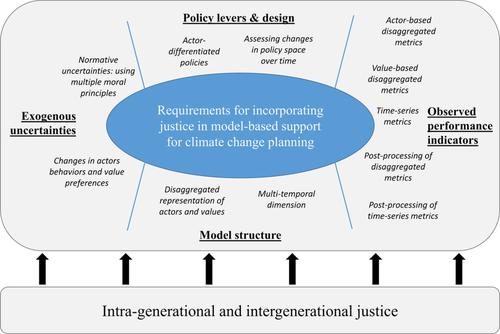当前位置:
X-MOL 学术
›
WIREs Clim. Chang.
›
论文详情
Our official English website, www.x-mol.net, welcomes your
feedback! (Note: you will need to create a separate account there.)
Enabling assessment of distributive justice through models for climate change planning: A review of recent advances and a research agenda
WIREs Climate Change ( IF 9.4 ) Pub Date : 2021-05-17 , DOI: 10.1002/wcc.721 Bramka Arga Jafino 1 , Jan H. Kwakkel 1 , Behnam Taebi 2
WIREs Climate Change ( IF 9.4 ) Pub Date : 2021-05-17 , DOI: 10.1002/wcc.721 Bramka Arga Jafino 1 , Jan H. Kwakkel 1 , Behnam Taebi 2
Affiliation

|
Models for supporting climate adaptation and mitigation planning, mostly in the form of Integrated Assessment Models, are poorly equipped for aiding questions related to fairness of adaptation and mitigation strategies, because they often disregard distributional outcomes. When evaluating policies using such models, the costs and benefits are typically aggregated across all actors in the system, and over the entire planning horizon. While a policy may be beneficial when considering the aggregate outcome, it can be harmful to some people, somewhere, at some point in time. The practice of aggregating over all actors and over time thus gives rise to problems of justice; it could also exacerbate existing injustices. While the literature discusses some of these injustices in ad-hoc and case specific manner, a systematic approach for considering distributive justice in model-based climate change planning is lacking. This study aims to fill this gap by proposing 11 requirements that an Integrated Assessment Model should meet in order to enable the assessment of distributive justice in climate mitigation and adaptation policies. We derive the requirements from various ethical imperatives stemming from the theory of distributive justice. More specifically, we consider both intra-generational (among people within one generation) and intergenerational (between generations) distributive justice. We investigate to what extent the 11 requirements are being met in recent model-based climate planning studies, and highlight several directions for future research to advance the accounting for distributive justice in model-based support for climate change planning.
中文翻译:

通过气候变化规划模型评估分配正义:对近期进展和研究议程的回顾
支持气候适应和减缓规划的模型,主要采用综合评估模型的形式,在解决与适应和减缓战略的公平性相关的问题方面能力不足,因为它们往往无视分配结果。在使用此类模型评估政策时,成本和收益通常在系统中的所有参与者以及整个规划范围内汇总。虽然一项政策在考虑总体结果时可能是有益的,但它可能在某个时间点对某些人有害。随着时间的推移,将所有参与者聚集在一起的做法会导致正义问题;它还可能加剧现有的不公正现象。虽然文献以特别和具体案例的方式讨论了其中的一些不公正现象,缺乏在基于模型的气候变化规划中考虑分配公平的系统方法。本研究旨在通过提出综合评估模型应满足的 11 项要求来填补这一空白,以便对气候减缓和适应政策中的分配公平进行评估。我们从源自分配正义理论的各种伦理要求中推导出要求。更具体地说,我们考虑了代内(一代人之间)和代际(代际)分配正义。我们调查了最近基于模型的气候规划研究在多大程度上满足了 11 项要求,
更新日期:2021-06-10
中文翻译:

通过气候变化规划模型评估分配正义:对近期进展和研究议程的回顾
支持气候适应和减缓规划的模型,主要采用综合评估模型的形式,在解决与适应和减缓战略的公平性相关的问题方面能力不足,因为它们往往无视分配结果。在使用此类模型评估政策时,成本和收益通常在系统中的所有参与者以及整个规划范围内汇总。虽然一项政策在考虑总体结果时可能是有益的,但它可能在某个时间点对某些人有害。随着时间的推移,将所有参与者聚集在一起的做法会导致正义问题;它还可能加剧现有的不公正现象。虽然文献以特别和具体案例的方式讨论了其中的一些不公正现象,缺乏在基于模型的气候变化规划中考虑分配公平的系统方法。本研究旨在通过提出综合评估模型应满足的 11 项要求来填补这一空白,以便对气候减缓和适应政策中的分配公平进行评估。我们从源自分配正义理论的各种伦理要求中推导出要求。更具体地说,我们考虑了代内(一代人之间)和代际(代际)分配正义。我们调查了最近基于模型的气候规划研究在多大程度上满足了 11 项要求,











































 京公网安备 11010802027423号
京公网安备 11010802027423号